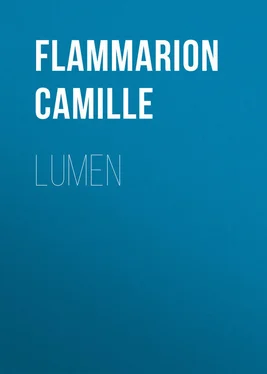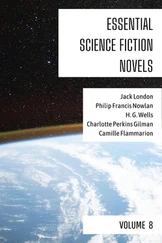Camille Flammarion - Lumen
Здесь есть возможность читать онлайн «Camille Flammarion - Lumen» — ознакомительный отрывок электронной книги совершенно бесплатно, а после прочтения отрывка купить полную версию. В некоторых случаях можно слушать аудио, скачать через торрент в формате fb2 и присутствует краткое содержание. Жанр: foreign_antique, foreign_prose, foreign_sf, на английском языке. Описание произведения, (предисловие) а так же отзывы посетителей доступны на портале библиотеки ЛибКат.
- Название:Lumen
- Автор:
- Жанр:
- Год:неизвестен
- ISBN:нет данных
- Рейтинг книги:4 / 5. Голосов: 1
-
Избранное:Добавить в избранное
- Отзывы:
-
Ваша оценка:
- 80
- 1
- 2
- 3
- 4
- 5
Lumen: краткое содержание, описание и аннотация
Предлагаем к чтению аннотацию, описание, краткое содержание или предисловие (зависит от того, что написал сам автор книги «Lumen»). Если вы не нашли необходимую информацию о книге — напишите в комментариях, мы постараемся отыскать её.
Lumen — читать онлайн ознакомительный отрывок
Ниже представлен текст книги, разбитый по страницам. Система сохранения места последней прочитанной страницы, позволяет с удобством читать онлайн бесплатно книгу «Lumen», без необходимости каждый раз заново искать на чём Вы остановились. Поставьте закладку, и сможете в любой момент перейти на страницу, на которой закончили чтение.
Интервал:
Закладка:
For a year (a year of this world is equal to ten of our years) they had felt themselves drawn by special attraction towards the terrestrial planet, and had observed with unusual interest and anxiety the march of events in that world. They had beheld the end of a reign and the dawn of glorious liberty, the conquest of the rights of man and the assertion of the great principles of human dignity. Then they had seen the cause sacred to liberty placed in peril by those who should have been the first to defend it, and brute force substituted for reason and justice.
I saw that he was describing the great Revolution of 1789, and the fall of the old political world before the new régime. Very mournfully they had followed the events of the Reign of Terror and the tyranny of that bloody time. They trembled for the future of the Earth, and felt doubtful of the progress of a humanity which, when emancipated, so soon lost the treasure it had just acquired. I took care not to let the senator know that I had just arrived from the Earth myself, and that I had lived there seventy-two years. I do not know whether he was aware of this, but I was so much surprised by this vision before me that it completely absorbed my mind and I did not think of myself.
At last my sight was fully developed, and I perceived the spectacle in all its details. I could distinguish, in the midst of the Place de la Concorde, a scaffold, surrounded by a formidable array of war, drums, cannon, and a motley crowd armed with pikes. A cart, led by a man in red, bore the remains of Louis XVI. in the direction of the Faubourg St. Honoré. An intoxicated mob lifted their fists to heaven. Some horsemen, sabre in hand, mournfully followed. Towards the Champs-Élysées there were ditches into which the curious stumbled. But the agitation was concentrated in this region. It did not extend into the town, which appeared dead and deserted; the terror had thrown it into a state of lethargy.
I was not present during the events of 1793, since that was the year of my birth, and I felt an inexpressible interest in being thus a witness of these scenes of which I had read in history. I have often discussed and debated the vote of the Convention, but I confess to you I see no excuse of state in the execution of such men as Lavoisier, the creator of chemistry, Bailly, the historian of astronomy, André Chenier, the sweet poet, or the condemnation of Condorcet, the philosopher. These have roused my indignation much more than the punishment of Louis XVI. I was intensely interested at being thus a witness of this vanished epoch. But you may imagine how much greater was my surprise, and how much more I was astonished, that I beheld in 1864 events actually present before me which had taken place at the end of the last century .
Quærens. In truth, it seems to me that this feeling of its impossibility ought to have awakened doubt in you. Visions are essentially illusory. We cannot admit their reality even though we see them.
Lumen. Yes, my friend, it was as you say, impossible! Now can you understand my experience in seeing with my own eyes this paradox realised? The common saying is, "One cannot believe one's own eyes." That was just my position. It was impossible to deny what I saw, and equally impossible to admit it.
Quærens. But was it not a conception of your own mind, a creation of your imagination, or perhaps a reminiscence of your memory? Are you sure it was a reality, not a strange reflection from your memory?
Lumen. That was my first idea; but it was so obvious that I saw before me the Paris of '93, and the events of January 21, that I could no longer be in any doubt about it. Besides, this explanation was anticipated by the fact that the old men of the mountain had preceded me in observing these phenomena, and they had seen, and analysed, and conversed on them as actual facts without knowing anything of the history of our world, and were quite unaware of my knowledge of that history. Further, we had before our eyes a present fact , not a past event.
Quærens. But, on the other hand, if the past can be thus merged into the present, if reality and vision can be allied in this way, if persons long since dead can be seen again acting on the scene of life, if new structures and metamorphoses in a city like Paris can disappear and give place to the aspect of the city as it was formerly – in short, if the present can vanish and the past be re-created, what certainty can we have of anything? What becomes of the science of observation? What becomes of deductions and theories? On what solid foundation can we base our knowledge? If these things are true, ought we not henceforth to doubt everything, or else to believe everything?
Lumen. Yes, my friend, these considerations and many others occupied my mind and tormented me, but they did not do away with the reality which I was observing. When I had assured myself that we had present before our eyes the events of the year 1793, it immediately occurred to me that science, instead of conflicting with these facts, ought to furnish an explanation of them, for two truths can never be opposed to one another. I investigated the physical laws, and I discovered the solution of the mystery.
Quærens. What! the facts were real?
Lumen. They were not only real, but comprehensible and capable of demonstration. You shall have an astronomical explanation of them. In the first place, I examined the position of the Earth in the constellation of the Altar as I have told you; I took the bearings of my position relatively to the Polar star and to the Zodiac. I remarked that the constellations were not very different from those we see from the Earth, and that except in the case of a few particular stars, their positions were evidently the same. Orion still reigned in the ultra-equatorial region, the Great Bear pursuing his circular course still pointing to the north. In comparing the apparent movements, and co-ordinating them scientifically, I calculated that the point where I saw the group of the Sun, the Earth, and the planets, marked the 17th hour of right ascension, that is to say, about the 256th degree, or nearly so. I had no instrument to take exact measurements. I observed, in the second place, that it was on the 44th degree from the South Pole. I made these observations to ascertain the star on which I then was, and I was led to conclude that I was on a star situated on the 76th degree of right ascension, and the 46th degree of north declination. On the other hand, I knew from the words of the old man that the star on which we were was not far from our Sun, since he considered it to be one of the neighbouring stars. From these data I had no difficulty in recalling the star that stands in the position I had determined. One only answered to it, that of the first magnitude, Alpha in the constellation of Auriga, named also Capella , or the Goat .
There was no doubt about this. Thus I was certain that I was on one of the planetary worlds of the sun Capella. From thence our Sun looks like a simple star, and appears in perspective to be in the constellation of the Altar, just opposite that of Auriga, as seen from the Earth.
Then I tried to remember what was the parallax of this star. I recalled that a friend of mine, a Russian astronomer, had made a calculation, which had been confirmed, of this parallax. It was proved to be 0,″046. – When I had thus solved the mystery my heart beat with joy. Every geometrician knows that parallax indicates mathematically the distance in units of the magnitude employed in the calculation. I sought then to recall exactly the distance which separated this star from the Earth, in order to prove the accuracy of the calculation. I only needed to find out what number corresponded to 0,″046. 2 2 Every one knows that the farther an object is, the smaller it appears. An object which is seen under an angle of one second, is at a distance of 206,265 times its own diameter, whatever it may be; because as there are 1,296,000 seconds in the circumference, the ratio between the circumference and its diameter being 314,159 × 2, it follows that this object is at a distance equal to 206,265 times its own diameter. As Capella sees the semi-diameter of the terrestrial orbit only under an angle 22 times smaller, its distance is 22 times greater. Capella is therefore at a distance of 4,484,000 times the radius of the terrestrial orbit. Future micrometrical measurements may modify these results concerning the parallax of this star, but they cannot change the principle upon which the conception of this work is grounded.
Интервал:
Закладка:
Похожие книги на «Lumen»
Представляем Вашему вниманию похожие книги на «Lumen» списком для выбора. Мы отобрали схожую по названию и смыслу литературу в надежде предоставить читателям больше вариантов отыскать новые, интересные, ещё непрочитанные произведения.
Обсуждение, отзывы о книге «Lumen» и просто собственные мнения читателей. Оставьте ваши комментарии, напишите, что Вы думаете о произведении, его смысле или главных героях. Укажите что конкретно понравилось, а что нет, и почему Вы так считаете.












